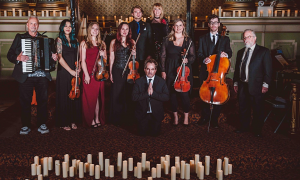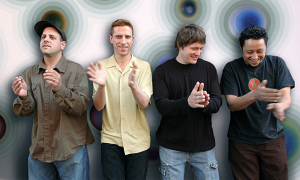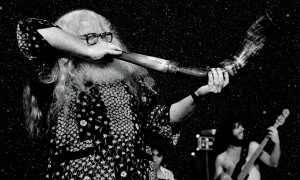Home » Jazz Articles » From the Inside Out » Music’s Where You Find It
Music’s Where You Find It

Ajoyo
Ajoyo
Ropeadope
2014
Multi-reed player Yacine Boulares has picked up, and left behind, musical footprints literally all around the world. He was born in North Africa (Tunisia) but grew up in Paris, where he studied philosophy at the Sorbonne and jazz performance at the National Conservatory and New School for Jazz. As a Fulbright scholar, Boulares continued his musical studies and began his professional career in New York City, where he deeply connected with Cameroonian native JoJo Kuo & The Afrobeat Collective, Fela Kuti's drummer.
After a few groove-oriented jam sessions together, Boulares became a full-time member of Kuo's band. "There's a pocket to this music that is natural to Cameroonian players," Boulares once explained. "When you're playing with them, it's like sitting on the nose of a jet. There is drive that can push the whole band. That's the magic. When they play, everyone locks."
Boulares has since moved on but didn't leave Kuo's groove from Cameroon completely behind: It inspired him to form Ajoyo and compose this joyous, eponymous debut. Ajoyo builds around Boulares a truly global village: Bassist Fred Doumbe (Cameroon), guitarist Alon Albagli (Israel), percussionist Foluso Mimy (Barbados), saxophonist and co-producer Jacques Schwarz-Bart and drummers Guilhem Flouzat and Thierry Arpino (all from France), keyboardist Can Olgun (Germany), trumpeter Linton Smith (New Orleans), and Manhattan-based vocalist Sarah Elizabeth Charles.
Ajoyo makes clear that the organic whole of this music sounds greater than the sum of its still very enjoyable parts. While Boulares' saxophone flows as free and soft as water throughout his compositions, these songs are just as strongly blessed by Charles' immediately welcoming, soothing and comforting voice, and by the serpentine contributions of drummers Flouzat and Arpino. Boulares' saxophone blows "Chocot" hard and hot: It floats lightly, then turns to parry the percussion and rhythm sections (especially the splashing cymbals), then turns again to harmonize with other horns in an Afro-Cuban big band sound. Albagli's guitar solo pulls pan-global electric blues from "Idanwo," which weaves in another horn chart that sounds like the Earth, Wind & Fire horns out on safari.
"Sokeijo" throws down a riotous and multicolored African rhythmic party: Its ensemble horns blow the sparks from the snare drum and hot rhythm guitar into a raging instrumental fire, while saxophonists Boulares and Schwarz-Bart oddly suggest Sonny Rollins, angular where you'd expect them to curve and turning in when you expect them to go out.
"Houb Ouna" tranquilly rises from Charles' warm and sunny vocal like mist from the wet grass after a summer morning sun shower, repeating the beautiful last line of its chorus ("I will live for you, this is my vow") until it fades. "Benskin" evokes powerful emotions and images with African music that also reflects Boulares' jazz experiences, as bassist Doumbe grabs the entire ensemble and leads it back into the groove to greet Smith's trumpet solo in swing time. After Charles' voice returns to majestically oversee this tune's fading into sunset, it finally dawns who Ajoyo sounds like: Flora Purim and Airto Moreira if they came from Cameroon and not Brazil.
"This album tells the stories of resilience I have experienced in my personal life and around me," Boulares shares in his liner notes. "It is the fruit of a lifelong process that has led me to transform my deepest emotions into joy."
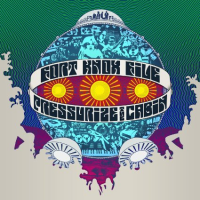 Fort Knox Five
Fort Knox FivePressurize the Cabin
Fort Knox Recordings
2015
Pressurize the Cabin delivers the best of the club dance experience—funky grooves, spacey loops and echoes, scratches and samples, shout outs and call outs—without overpriced drinks or the ubiquitous smoke, glitter or perfume. The core four of the Fort Knox Five—Sid Barcelona, Jon Horvath, Rob Myers and Steve Raskin—herewith present a jumping party that's just waiting for you to climb onboard.
"Reach" smoothly opens pop, funk, R&B, hip-hop, electronic and groove styles, then blends them all into the FN5's one of a kind instrumental smoothie, as Flex Mathews' rap flows strong and deep as the Mississippi. And it's almost TOO easy to grab and hold onto the instrumental hook and vocal melody of "Whatcha Gonna Do," with a closing vamp so locked down that this section of the Cabin sounds airtight.
The FN5 also find ways to be creative within the groove. "Swinging on a Rhyme" introduces modern electronic funk to the tempo and sound of classic swing music, complete with a rumbling big-band drum break and antique-sounding production on the guitar and horns. Ashley Slater, on loan from the UK, leads "Fire in My Belly" with a vocal that's cool and laconic yet deeply in the pocket, while his trombone saunters through the mix like it's strolling down a sunny New Orleans jazz avenue.
"Cinco to the Brinco" sketches in Spanish trumpet and Latin hip-hop plus shades of the Caribbean from reggae toasting by vocalists Felix Perez and Frankie Rosado on loan from DC's Latin legends The Empresarios. The straight-up reggaeton of "24 Hours to Set It Off," featuring Sleepy Wonder from Thievery Corporation, dives even deeper into Caribbean waters. Clever song titles can often be more pun-ny than funny, but "Mission to the Sitars" works thanks to instrumentation that layers sitars into the horns, synthesizers, percussion, shouts and raps, and hip-hop beats of its frothy funk parfait.
If you prefer one particular style of dance or funk music, you're sure to find it in some form or another on Pressurize the Cabin. While the Fort Knox Five's 2008 debut Radio Free DC spotlighted local rappers and musicians, Pressurize the Cabin expands to a more global scope. As the result, the Fort Knox Five is no longer the greatest electronic funk party band on the US East Coast—they're the greatest GLOBAL electronic funk party band on the US East Coast.
 Red Garland
Red GarlandSwingin' on the Korner
Elemental Music
2014
It's often been written about many (sometimes less deserving) artists, but in his case it's genuinely true: Pianist Red Garland played on too many classic jazz albums—especially in bop quintets led by Miles Davis and John Coltrane—to fully count. Swingin' on the Korner, a 1977 trio date with bassist Leroy Vinnegar and drummer Philly Joe Jones recorded live at Keystone Korner, adds one more title to this uncountable list. Swingin' reunites Garland with drummer Jones, who teamed with Garland and bassist Paul Chambers in the engine room of the first great Miles Davis quintet, but captures the only time that these three jazz heavyweights performed together. It is also the first and only release of these exceptional performances.
"I was determined from the start to build the most exhaustive package ever created for Garland that truly celebrates his memory," explains Zev Feldman, who co-produced this two-disc set with Todd Barkan, who owned the Keystone Korner at the time of this performance. "There's never been a book on Red and this is the closest there is. We built this and I couldn't be more proud. He deserves it."
Just like there are too many great albums, there are almost too many highlights on this set to count. Highlights from disc one include "Billy Boy," classic piano trio bebop that first appeared on Davis' landmark Milestones (1958, Columbia), through which Garland's fingers first scurry like a mouse frantically searching for misplaced cheese, then roar with fully-voiced chords; an elegant and stately slow dance with the ballad "It's Impossible"; and the perfectly titled "Blues in Bebop," painted in notes that come straight from the blues gutbucket but skipping and hopping in the energetic and sharp rhythms of bebop.
Disc two is programmed around jazz pillars constructed by Thelonious Monk, Mel Torme and Milt Jackson, and proves even more fruitful. Much like its composer, Garland picks up small melodic fragments of Monk's "Straight, No Chaser" and explores them from multiple directions, but he also keeps swirling notes around its melodic center to help the bass and drums more deeply dig their rhythmic groove. In "On a Clear Day," Garland's piano bounces through his unaccompanied first verse like a bright Dave Brubeck sunrise, and he swaddles "The Christmas Song" in soft jazz and blues with a touch of Cedar Walton (plus a charming closing quote from "The Little Drummer Boy").
The Jackson homage "Bags' Groove" pulls out all the stops. This sneaky cool mixture of jazz, blues and funk not only captures the spirit of its namesake but of Garland's smooth but strong piano sound, and may have been the perfect tune for not only this pianist, but for this trio.
This reviewer is not a pianist. But Benny Green is, and the pianist's reflections that Green shares in its liner notes comprise the best conclusion from Swingin' on the Korner: "What is consistent in Red Garland's piano playing throughout the expanse of his two-chapter solo recording career—from A Garland of Red in 1956 through Misty Red in 1982—is the way Red Garland touches the piano. The sound and feeling achieved reveal him as a perennial romantic—time and again, there's Red playing sexy and hip, warm as the sun but somehow so gentle and so inviting. Every note he plays seems in service of disarming his lover into submission. He is so slick and economical, so earthy and ultimately happy and life-affirming."
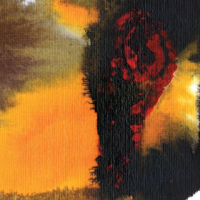 Polar Bear
Polar Bear Same As You
The Leaf Label
2015
Geography is rarely something that a writer considers when preparing a review. But Same as You sounds profoundly shaped by where it was mixed and mastered—in the Mojave Desert, by producer Ken Barrientos and Polar Bear drummer and bandleader Sebastian Rochford. "We spent a couple days at his studio then headed out to the desert for five days to mix it," Rochford recalls.
Polar Bear's sixth release sounds wide open, dry and warm, quiet and loud, barren and vibrant, curious and mysterious. Because Rochford originally conceived and composed this music as a single, continuously flowing suite, then subsequently segmented it into six discrete movements, it's quite difficult to hear where one song ends and the next one begins.
Same as You opens with a prayer recited toward an unnamed creator ("Life, Love and Light"). Much of the following "We Feel the Echoes" is Rochford's flickering drum heartbeat, with double bassist Tom Herbert and tenor saxophonists Mark Lockheart and Pete Wareham tentatively stepping, but rarely diving, into Rochford's scattershot drumming and hovering electronics.
The drummer shifts to a tribal sound to sketch out "The First Steps" with harmonizing saxophones—dry in tone and abstract in approach—which build this melody up by collecting, repeating, and connecting small fragments into larger phrases that dissolve into electronics like the sun submerging into twilight. These electronics bridge into "Of Hi Lands," floating electronic ambience that eventually builds into a solid framework of both acoustic and electronic music—even the "live" saxophones seem ambient in these "Lands."
"Don't Let the Feeling Go" lifts this entire set's sound and vision thanks to vocals from Hannah Darling and Gar Robertson, who chant the title like an incantation, and additional tenor sax from Shabaka Hutchings, whose bobbing and weaving staccato notes counterpoint the drum and bass lines until longer saxophone lines eventually flow as if breaking through a restraining dam.
The set-ending "Unrelenting Unconditional" follows this same pattern except for twenty minutes instead of seven: It opens with Rochford's drums paddling at an almost imperceptible level of volume until the bass line swims alongside, and then saxophones slowly rise up from their rhythm like early morning mist. It takes ten minutes before the tenor saxophones seem to fully unravel and fly, but at least they eventually take off.
Brian Eno's ambient music and production techniques seem to permeate Same as You as much as any instrument recorded on it. It captures and presents a genuinely unique blend of acoustic and electronic jazz, often in high concepts and low volume.
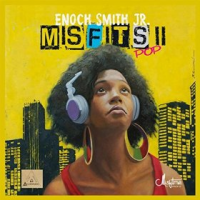 Enoch Smith Jr.
Enoch Smith Jr. Misfits II: Pop
MisfitMe Music
2015
Growing up in the Pentecostal Church of God by Faith (in Rochester, NY) has been the biggest musical influence on pianist Enoch Smith Jr. He titled his 2010 self-produced debut Church Boy and continues to serve as full-time Director of Music and Worship and pianist for Allentown (NJ) Presbyterian Church. "Growing up and playing mostly in church, you get a whole different side of what music is all about," Smith explains. "For me, it was always more of a spiritual connection than a connection of the head."
Smith's original Misfits, released in 2011, focused on his own, self-taught jazz style compositions and his core ensemble: Bassist Noah Jackson, drummer Sangmin Lee and vocalist Sarah Elizabeth Charles. Misfits II: Pop keeps Smith's ensemble intact but changes their target by expanding into pop, hip-hop and gospel music, It also marks the first release on Smith's own MisfitMe label.
Misfits II: Pop aims at your heart and your head and squarely finds both marks. Smith bravely begins by reconstructing The Beatles' "Yesterday" to feature Charles declaring "I believe" over and over in a jazzily soulful (soulfully jazzy?) voice, turning one of the most covered songs in pop history into a spiritual journey into faith.
For "You Got Me (Sometimes)," Smith wrote a second melody and set of lyrics into "You Got Me," a 1999 hit for The Roots featuring Erykah Badu. Smith builds his original "Everything's Alright" like a Herbie Hancock Headhunters' tune, with acoustic piano, a propulsive electric bass line and hard-rockin' drum beat; Charles' voice dives just a bit deeper and darker, while the pianist solos like a swordsman, deft and aggressive and sharp.
Smith doubles down on "Sweepin' through the City," a standard in Shirley Caesar's concert repertoire for more than fifty years, casting one version in straight-ahead acoustic jazz and a second in elastic hip-hop featuring New Orleans rapper Dee-1. "I grew up hearing that song at least three or four times every week," Smith recalls. "I wanted to pay homage to this great songwriter and composer, Shirley Caesar, who's had a great career but who outside the gospel world is virtually unknown."
But vocalist and pianist most brightly shine on "One of Us," Smith's insightful reflection off of Joan Osborne's pop spiritual hit. His sparse, almost classical, arrangement mines profound gold from the original's curious and contemplative mood, while Charles' intuitive vocal bridges the bandstand and the pulpit. It's the sound of Smith wondering out loud if genuine people who attempt to communicate deeply and honestly with others may feel like Misfits in our age of instant, disposable digital communication. "As technology improves, our humanity just kinda declines and our value for each other is depreciating," he muses. "This record embodies that concept: What if you look at everyone like that person is a reflection of God, then how would we treat each other?"
 Spin Marvel
Spin Marvel Infolding
Rare Noise
2015
As a Professor of Jazz (Drums/Percussion) at the Royal Academy of Music in London, and as contributor to recordings and performances by Lee Konitz, Dave Holland, Bill Bruford's Earthworks and other progressive jazz thinkers, drummer, composer and bandleader Martin France is accustomed to deep and heady jazz waters. In Spin Marvel, France teams up with two of Norway's most exploratory progressive jazz musicians, electronic sound sculptor Terje Evensen and electronic/electric trumpet pioneer Nils Petter Molvaer.
Infolding captures Spin Marvel's debut. "It was recorded live in a four hour session for the BBC," France reveals. "We were all very happy with the session and how the music was sounding so I forwarded the master files to producer Emre Ramazanoglu, who then worked with the music and produced it for us."
To borrow illustrations from another culture, Infolding is as complex and detailed as the art of origami yet as massive and uncompromising as Mount Fuji. Evensen and Molvaer open "Canonical" with electronics and trumpet that sound like an extraterrestrial communication from a civilization in distant space, floating in free time, until Tim Harries' rampaging bass and France's drums storm in.
In "Tuesday's Blues" and "Two Hill Town," France's explosive playing on his snare and cymbals honor the sound and spirit of drummer Elvin Jones, linchpin of some of John Coltrane's most ferocious rhythm sections. Moelvar's trumpet sings "Tuesday's Blues" in blue sound and feeling but frozen and fractured, with ice where its soul might once have been. "Two Hill Town" ping-pongs across its rhythmic pulse but then grows across a broader landscape, as the bass, trumpet and other electronics menacingly surround France's thunderous drums like the feeling in the wind right before a bad storm.
"I tend to mold my mixing style to the project at hand and on this one I just was led to that kind of dramatic, spacy sound by immersing myself in the mix and creating as much of a performance there as I could," Ramazanoglu explains. "I intensively used convolution processing to get different instruments modulating each other and a lot of interactive compression and effect processing to shape the individual voices into larger, dense blocks of sound in which the boundaries between the instruments are blurred perhaps."
All these different techniques and textures come together in "Leap Second": In its ambient beginning, Moelvar muses on the blues, his trumpet the fulcrum between the electronics and bass but trapped in the amber of suspended time, until France breaks his shackles and leaps into hard swinging jazz with a tribal and powerful sound. "Leap Second" somehow manages to stay together and to fall apart, and serves as a milepost on the modern music continuum to which poet W.B. Yates seemed to point in his historic "The Second Coming": "Turning and turning in the widening gyre / The falcon cannot hear the falconer; Things fall apart; the centre cannot hold; Mere anarchy is loosed upon the world..."
"The use of openness and space is a very important part of what we do," France concludes. "And creating something from this place allows the musician to feel free and uninhibited and move it in a direction they want to express."
Tracks and Personnel:
Ajoyo
Tracks: Jekoro; Chocot; Idanwo; Benskin; The Pearl; Sokeijo; Tashikere; Houb Ouna.
Personnel: Yacine Boulares: saxophones, clarinet, percussion, vocals; Jacques Schwarz-Bart: tenor sax; Sarah Elizabeth Charles: vocals; Linton Smith: trumpet, vocals; Alon Albagli: guitars, vocals; Can Olgun: piano, Fender Rhodes, C3 organ; Foluso Mimy: percussion, vocals; Fred Doumbe: bass, vocals; Guilhem Flouzat: drums; Thierry Arpino: drums, udu.
Pressurize the Cabin
Tracks: Reach (featuring Flex Mathews); Fire in My Belly (featuring Ashley Slater); Whatcha Gonna Do (featuring Mustafa Akbar); Pressurize the Cabin (featuring Vokab Kompany); Swinging on a Rhyme (featuring Flex Mathews); Keep It Poppin' (featuring Mustafa Akbar); Ready Go (featuring Raashan Ahmad); Cinco to the Brinco (featuring The Empresarios); 24 Hours to Set It Off (featuring Sleepy Wonder); Mission to the Sitars.
Personnel: Fort Knox Five: Sid Barcelona, Jon Horvath, Rob Myers and Steve Raskin; with Raashan Ahmad: vocals; Mustafa Akbar: vocals; Brad Clements: trumpet; Joe Herrera: trumpet; Matthew Hotez: trombone; Chelly Jane: vocals; Flex Mathews: vocals; Javier Miranda: percussion; Frank Mitchell: saxophone; Jon Modell: drums; Felix Perez: vocals; Scarlett Quinn: vocals; Frankie Rosado: vocals; Ashley Slater: trombone, vocals; Sleepy Wonder: vocals; Vokab Kompany: vocals.
Swingin' on the Korner
Tracks: Disc One: Love for Sale; I Wish I Knew; It's Impossible; Billy Boy; Dear Old Stockholm; If I'm Lucky; Blues in Bebop; On Green Dolphin Street. Disc Two: Straight No Chaser; On a Clear Day; The Christmas Song; The Best Things in Life Are Free; Never Let Me Go; Autumn Leaves; Bags' Groove; It's All Right With Me/The Theme.
Personnel: Red Garland: piano; Leroy Vinnegar: bass; Philly Joe Jones: drums.
Same as You
Tracks: Life, Love and Light; We Feel the Echoes; The First Steps; Of Hi Lands; Don't Let the Feeling Go; Unrelenting Unconditional.
Personnel: Polar Bear: Sebastian Rochford: drums; Tom Herbert: double bass; Leafcutter John: guitar, electronics; Mark Lockheart: tenor sax; Pete Wareham: tenor sax; with Leo Abrahams: choir/chorus; Lilith Ai: choir/chorus; Ken Barrientos: choir/chorus; Michel Benita: choir/chorus; Hannah Darling: vocals; Kit Downes: choir/chorus; Ranjana Ghatak: choir/chorus; Ruth Goller: choir/chorus; Alice Grant: choir/chorus; Chris Haywood: choir/chorus; Shabaka Hutchings: tenor sax; Zak King: choir/chorus; Poppy Mullings: vocals; Dave Okumu: choir/chorus; Gar Robertson: vocals; Gen Russell: choir/chorus; Andy Sheppard: choir/chorus; Paul Sinclair: choir/chorus; Jason Singh: choir/chorus; Jaelee Small: choir/chorus.
Misfits II: Pop
Tracks: Yesterday; Everything's Alright; One of Us; One Thing; A Misfit's Theme III; Sweepin' through the City; You Got Me (Sometimes); Sweepin (Stairwell Intro); Sweepin; through the City.
Personnel: Enoch Smith, Jr.: piano; Noah Jackson: bass; Sangmin Lee: drums; Sarah Elizabeth Charles: vocals; Dee-1: vocals; Nate Anderson: vocals; Renee Anderson: vocals.
Infolding
Tracks: Canonical; Tuesday's Blues; Two Hill Town; Leap Second; Same Hand Swiss Double Pug; Minus Two.
Personnel: Martin France: drums; Terje Evensen: electronics; Tim Harries: bass; Nils Petter Molvaer: trumpet; Emre Ramazanoglu: drums.
< Previous
Bones Blues
Next >
Humanity Part II
Comments
Tags
Red Garland
From the Inside Out
Chris M. Slawecki
Ajoyo
Yacine Boulares
Jojo Kuo
Fela Kuti
Fred Doumbe
Alon Albagli
Jacques Schwarz-Bart
Guilhem Flouzat
Thierry Arpino
Can Olgun
Sarah Elizabeth Charles
Earth Wind & Fire
Sonny Rollins
Flora Purim
Airto
Fort Knox Five
Ashley Slater
Thievery Corporation
Red Garland Trio
Miles Davis
John Coltrane
Leroy Vinnegar
Philly Joe Jones
Paul Chambers
Todd Barkan
Thelonious Monk
Mel Torme
Milt Jackson
Dave Brubeck
Cedar Walton
Benny Green
Polar Bear
Sebastian Rochford
Tom Herbert
Mark Lockheart
Pete Wareham
shabaka hutchings
Brian Eno
Enoch Smith, Jr.
Noah Jackson
Sangmin Lee
The Beatles
Erykah Badu
Herbie Hancock
Headhunters
Joan Osborne
Spin Marvel
Lee Konitz
Dave Holland
Bill Bruford
Martin France
Terje Evensen
Nils Petter Molvaer
Tim Harries
Elvin Jones
For the Love of Jazz
 All About Jazz has been a pillar of jazz since 1995, championing it as an art form and, more importantly, supporting the musicians who create it. Our enduring commitment has made "AAJ" one of the most culturally important websites of its kind, read by hundreds of thousands of fans, musicians and industry figures every month.
All About Jazz has been a pillar of jazz since 1995, championing it as an art form and, more importantly, supporting the musicians who create it. Our enduring commitment has made "AAJ" one of the most culturally important websites of its kind, read by hundreds of thousands of fans, musicians and industry figures every month.







